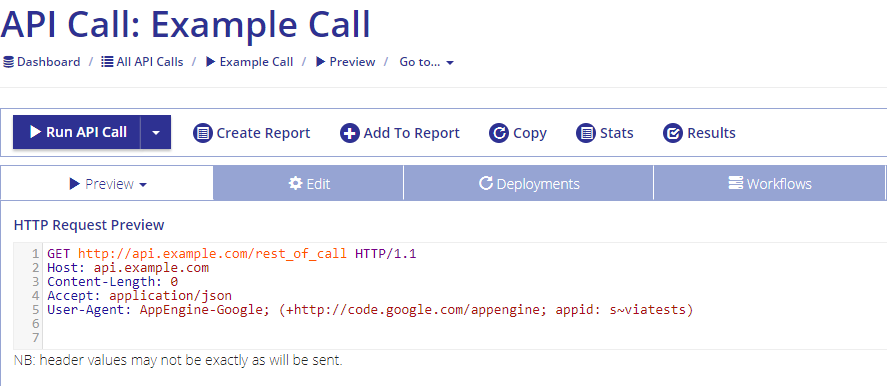Examples
Example Use
Key Concepts
It is possible to bind objects to workspaces associated with API calls and workflows. This allows flexible and powerful use of variables in API calls and workflows so that users are not limited to fixed values. This opens up the potential to create more dynamic API calls and workflows.
API Call and Workflow Workspaces
Currently, in the APImetrics software, it is possible to bind two related objects to a workspace: API call and workflow.
Because of the nature of the workflow workspace to force its API calls to run in its environment, the workflow workspace always overrides the API Call workspace.
Variables in API Call objects are searched for first in the workflow workspace, then in API Call workspace and lastly in the global workspace.
The variable search order (scope) is
Work flow workspace
API Call workspace
global workspace
The global workspace is always the last workspace to be searched for variables. If the workspace of Work flow is global, the order will be
API Call workspaces
global workspace
API Call elements subject to contain variables (and parsed for retrieval):
• API URL
• URI Parameters: name and value
• Headers: name and value
• Content: body content
◦ text
◦ json
◦ xml
◦ URLEncoded variables: name and value
• Conditions: Property and Value
• WebHooks: parameters
Example: Set a URI as a Variable
In this example we will set a variable to be the root URI for API calls and show it used in an example.
Firstly, we set the variable test_uri_1

In the call editor you will enter the following in place of the URI:
{{test_uri_1}}/rest_of_the_apicallWhich would look like this before saving the call:
GET {{test_uri_1}}/rest_of_call HTTP/1.1
Host: api.example.com
Content-Length: 0
Accept: application/json
User-Agent: AppEngine-Google; (+http://code.google.com/appengine; appid: s~viatests)Or, in the editor.

When you save the call and run it, the URI will be placed into the call.
GET http://api.example.com/rest_of_call HTTP/1.1
Host: api.example.com
Content-Length: 0
Accept: application/json
User-Agent: AppEngine-Google; (+http://code.google.com/appengine; appid: s~viatests)
Updated 5 months ago